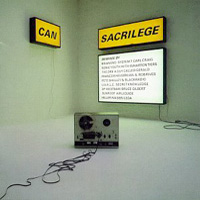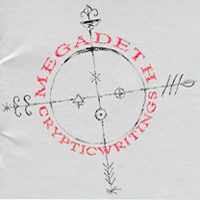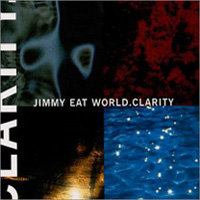 Can
Can
Can You Dig It?
Sacrilege (Mute)
An interview with Holger Czukay (bass), Irmin Schmidt (keyboards), Jaki Liebezeit (drums), Malcolm Mooney (vocals), and Michael Karoli (guitar)
by Nik Rainey
On the occasion of the release of Sacrilege (Mute), a 2-CD collection of contemporary remixes of classic Can material from artists ranging from contemporaries (Brian Eno), ex-punks heavily indebted to the band (Pete Shelley [and Black Radio], Sonic Youth [with Wharton Tiers], Wire’s Bruce Gilbert), and modern electronic soundscapers (A Guy Called Gerald, the Orb, U.N.K.L.E., and many others), I had the opportunity to speak with the five original members of this most seminal of Krautrock bands. Interestingly, the only language barrier I encountered was from the single American in the band. Observe.
So what do you think of the new remix album?
Holger Czukay (bass): I think it’s excellent. I like the new direction of it – like cutting out windows from the original product and rebuilding it from that. I think this is a very good art form at the moment, the artform of the nineties.
Irmin Schmidt (keyboards): I like to hear surprising new aspects of our own music from other musicians, to hear the music with somebody else’s ears.
Jaki Liebezeit (drums): I think it’s a natural development from what we did – I think if the group had stayed together it would sound very much like that today. The development of electronic music had already started in Can’s time – two of the members of the band had been students of the great Karlheinz Stockhausen and his influence on the group was very strong.
Czukay: He’s one of the German mountains in music. Much of the music of the nineties owes him the most, in the sense that he’s more interested in organic sort of soundworlds rather than dance rhythms, and that’s something that has come through us into modern electronic music.
Malcolm, what do you think of the album?
Malcolm Mooney (vocals): My quoted response has been “congratulations and good luck.”
Do you wish to elaborate on that?
No.
Okay… It’s interesting that most of the artists on Sacrilege are more techno-oriented and that most of the more conventional rock musicians refused to take part, because they were unwilling to tamper with it.
Michael Karoli (guitar): That is also a very great compliment from them, as much as if they had joined in. And others, like Brian Eno, gave us three very short pieces, two of which were not used on the record. I don’t know why. I think Eno is a very conscientious person and he doesn’t want to come up with crap (laughs).
 It seems that the artists have all taken various liberties with the material, particularly A Guy Called Gerald, whose version of “Tango Whiskeyman” doesn’t seem to have any of the original left in it!
It seems that the artists have all taken various liberties with the material, particularly A Guy Called Gerald, whose version of “Tango Whiskeyman” doesn’t seem to have any of the original left in it!
Schmidt: I listened for it… when Mute sent me the disc, I performed sort of a blindfold test to see how long it would take me to recognize each one, and when that one came up, I really couldn’t figure out what it was! I still haven’t figured out what part of it is there – I did find a tiny rhythm loop that I think is from another Can song!
Czukay: But I like the idea that you can build something completely new and there’s this little atomic element of the song still there but you have to search for it. It’s wonderful when you can do that. On “She Brings the Rain,” for example, Irmin made the conscious decision not to play on the song because he thought the drums would damage the product in some way, and yet his presence is felt because of his absence. What you don’t play is as important as what you do.
What have each of you been doing lately?
Schmidt: I am working on, well, I call it an opera, so of course it’s not a classic opera. I’m working out the rhythm of the piece with Jaki so you can imagine what kind of opera it will be – the libretto comes from a very famous trilogy of books called Gormengaft, and the music will be a mixture of opera singers and all kinds of different styles. That’s quite a big project – as a full-time job it’s taken about three years. It’ll be premiering in August of next year at a music fair in Cologne, and at the same time we’re trying to make a film of it, a real film, only the actors don’t talk, they sing.
Karoli: I have been on something of a new track myself, working on what I think of as real electronic music, but it doesn’t sound like it. Something very different than anything I have ever done. I played some of it for Holger and he calls it “post-post-rock,” and whatever that means is what it is.
Liebezeit: At the moment I am working with two synthesizer players, more in the electronic music field. I am just dealing with record companies now, but soon I think you will hear something from the Club Off Chaos, that’s what it’s called. With a double F.
Mooney: Nothing.
Are there any albums or tracks that stand out as particularly successful to you?
Liebezeit: I think the first four albums are best, because we played live and worked together in the studio. After that, the spirit was not there. We had lost some of the tribal feeling because we didn’t have to be in the studio all at once anymore. The tensions in the beginning were very good in a way because it forced us to work together.
Mooney: There’s a couple of ways I like to approach it. As a performer, I like the last album, Rite Time, but as a listener I enjoy a track by the band – I wasn’t in the band at the time – called “Mother Sky.”
Czukay: “Yoo Doo Right” was very important, though for me it was a catastrophe. We were just starting and had very little equipment. We didn’t even have a mixer, just the two pre-amps, with five channels in each, and we would use that to put it right on tape. And I remember that day very well because a little blue smoke started coming out of one of them and I said “This is the end.” Malcolm Mooney was just beginning with us and we were still unsure which direction we wanted to go. And suddenly, he just went up to the mic and it was such an event because his articulation was so much a part of the rhythm, that we thought “Ah, zo, this could be here also” and that gave the ignition to the rock aspect of Can.
Karoli: It changes. For me,Tago Mago and Future Days are probably the best. I think they’re probably considered the most informative things about the band’s music – the cleanness of spirit on Tago Mago and the magnitude of moods and pictures on Future Days. But that is my personal taste. Like Ege Bamyasi I didn’t like because I became very sick during the making of it, but I listened to it a few years ago and thought, “goodness, what a good album!” One is seldom one’s own best critic.
It must be gratifying to see so much attention given to your band now, since it wasn’t exactly popular at the time.
Karoli: That is almost the wisdom of the ages, that the prophet is without honor in his own country. We had a number one song in Germany in ’71 called “Spoon,” due to the fact that it was the title music of a very important TV series, one of the sacred institutions of German TV – when it was on you could not get a taxi in the whole country because everyone was at home watching this, so we had a number one for two months, I think. And even then, when we played what we considered to be “Spoon” live, right afterwards, people would be shouting, “Play `Spoon!'” Because for us the piece basically consisted only of a certain tempo, and the fact that the piano played one note through the whole piece (laughs), so every time it would be different. In that respect also the remix album is very much in the Can spirit.
Leibezeit: We were not loved in Germany. They thought we were ugly because we did not sound like the Rolling Stones. Many German groups had tried to sound like the English, sing in English, and they are now completely forgotten. They had no chance – you go to England trying to sound English and they will take no notice of you. You have to be original. You must be like a painter, you cannot imitate Picasso, because everyone could tell, so you have to be yourself.
Where do you hear Can’s legacy in contemporary music?
Schmidt: Sometimes people say it, and I don’t hear it, so it must be their spirit more than the sound. Sometimes it’s quite obvious, you really hear it in their rhythm, the voice, they use monotony and kind of hypnotic rhythms. During interviews, some journalists will come with a lot of tapes and records, a lot of Japanese groups like Ghost, and Tortoise from Chicago… and there was a lot of stuff that sounded so much like Can that I would leave the studio and come back and I thought they had put on an old live tape of ours! I don’t remember them all… I remember one Japanese band that sampled Jaki’s rhythm from “Mushroom” and even used some sounds from it and then put some very unimportant little noises and bad singing on it and just gave it another title. I’d hear things like that and think “Well, that’s very strange.”
Czukay: I don’t know when I say what I like that it is necessarily Can-influenced, you would have to ask the artists. I’m sure many of them don’t even like Can. What I really like is Aphex Twin – his music is very easy for me to get lost in. It’s strange when people make their arguments about electronic music – it has no soul, it’s not human, whatever they say – and you hear something like Aphex Twin and there are these wonderful little minimalistic jewels. It’s artificial-made but organic-grown.
Karoli: I think that the influence, the legitimate influence, is sort of limited to the technical side. If I wanted to sound like the Rolling Stones, it’s not so much that I could call them an influence, more like I wanted to be like them. But if I learn from Keith Richards how to play simple riffs, I could call that a real influence. And it’s hard for me to say if what I consider to be the most important element of Can, the spontaneous creation of things, is only in the spirit of the times or if it comes through us. I can’t say we caused it, but we certainly now fit in to this very spontaneous creation that the techno people do on stage. We called it “instant composition.”
Leibezeit: Nothing was ever written actually, maybe some sketches of words maybe, but the music was never pre-planned, it was all made in the studio like a laboratory where you would create a new kind of plastic or something.
Any thoughts on Can’s influence, Malcolm?
Mooney: No.
What about the way your lyrics fit into the music?
Um… a lot of it was spontaneous and premeditated. You mean a vocalist as a musician or as a voice?
I suppose as a musician.
I think, um… what was the question?
Karoli: The thing is that the composition goes away from the personal and to the collective, like an ant state is the individual and not the ant. The individual was Can. We were just helping Can. We made a point of developing a collective mind. It came from somewhere outside, we only worked as an interface, we really tried to let inspiration flow through us. Can music was the product of the struggle between four or five people and the struggle was the most important thing.
Speaking of struggle – there’s a story I was told, something about Jaki chasing Holger around the studio with an axe?
Karoli: Yes, that was Jaki. Apparently he didn’t actually want to chop him up, he just wanted to prove a point. That’s what he said afterwards, at least. I think if he wanted to chop him up, he could have because Holger didn’t run very fast.
Liebezeit: It was more of a joke, you shouldn’t take that seriously. He had provoked me – he’s quite a provocative character – and there was this axe around, and I picked it up just to see if it would frighten him. It worked.
Karoli: The question I have is what was the axe doing in the studio in the first place? I’ve never understood that.
Is there going to be another Can album?
Czukay: Yes, there will be a live album which Michael is working on very intensely. That should come out next year because that is the 30th anniversary of Can. We have tried many times to gather together live Can tapes but they can be very rare. Sometimes I would take a very simple cassette recorder on stage and make sort of a control recording of the concert, but it’s like looking at only an inch of a landscape. But these could be very good as materials in terms of remixes, so by this method, even the trashiest material in the world can be sort of a gold metal at the end. Actually, there is no trash.
What about new material?
Liebezeit: I think it would be unlikely. We may record something but we will never play live again because the musical group spirit is gone. We all live and work apart from each other now, so it would not be so much like a conversation but four or five monologues at the same time.
Czukay: I don’t want to say no but I doubt it. It depends a little bit on the circumstances. There must be a reason, there must be an opportunity… and if that doesn’t work then it’s better to look around for new combinations.



